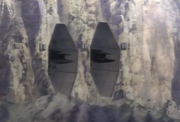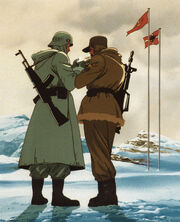| Black Sea War | ||||||||||||||
|---|---|---|---|---|---|---|---|---|---|---|---|---|---|---|
 Land of the Black Pearl, 2 July 1994 | ||||||||||||||
| ||||||||||||||
| Belligerents | ||||||||||||||
Members Allies Supported by |
Allies Supported by |
Non-Aligned Independent Supported by Poseidon's Base Supported by | ||||||||||||
| Strength | ||||||||||||||
| 800,000+ | 1,000,000+ | 600,000+ | ||||||||||||
| Casualties and losses | ||||||||||||||
| 100,000+ | 300,000+ | 100,000+ | ||||||||||||
The Black Sea War was a regional war centered in the Black Sea and its neighboring countries that started on 19 September 1994 and formally ended on 16 April 1997.
During the war, NATO and the United Nations (specifically the UNSC) was not able to intervene and was only limited to carrying out peacekeeping roles and humanitarian aid. The UN was also able to host several peace talks, eventually brokering a peace agreement to end the war.
It was initially expected that Russia would dominate the conflict but as the war dragged on there were no combatants who had a clear advantage over the others. Unexpectedly, the Alliance of United Eurasia were able to hold its ground against Russia and its allies.
Background[]
- Main article: History of the Eurasian Federation#Formation
In the night of 9 June 1994, Turkey conducted a clandestine deep underwater nuclear test in the Black sea under its strategic nuclear arms program. However a problem occurred with the weapons system and the nuclear warhead exploded before even reaching 200ft. The succeeding events were beyond everyone's expectations and even what could scientists calculate and estimate. A large hole, named the "Black Pearl" by the media, was left on the site of the explosion due to the underestimated yield of the nuclear explosion.

The Black Pearl (6 hours after explosion) still submerged under water although steadily drying up.
The incident left an environmental and political crisis. International and internal pressure was mounting on the Turkish government as it is being criticized world-wide for the incident. An international investigation was launched alongside a separate Turkish one. Rumors and conspiracy theories about the event were viral in the internet which included a plausible scenario.

Poseidon's Base, the secret Greek military installation with two submarines in its underwater docks
Also, the incident revealed a secret underwater military installation within Bulgarian littoral zone that is being operated by Greece with two new submarines stationed in it. Bulgaria quickly denied allegations that it was having a secret deal with Greece to jointly control the Black sea and to annex Crimea, Georgia, the Gallipoli peninsula, and the Russian districts of Southern Federal District and North Caucasian Federal District. This revelation raised suspicions for Greek interests in the area, along with the other Black sea countries' roles in the incident, and the crisis is rapidly turning into a military conflict.
By 11 September 1994, only two days after the dam that saved the remaining waters of the Black sea was built, the Black Sea Fleet and the Russian military was mobilized with authorization from the Kremlin for the sake of its national security. This was highly criticized by the other countries of the Black Sea, the United Nations, and by NATO.

Georgian, Armenian, and Azerbaijani heads of state shook hands in the official declaration of existence of the AUE
By 12 September, it was pandemonium in the diplomatic community. Bulgaria, Georgia, Romania, Russia, Turkey, Ukraine, and Greece all scrambled to get international support, political and military allies, and to mobilize and get their respective countries ready for war. Georgia was able to gain the support of Armenia and Azerbaijan, forming the military bloc Alliance of United Eurasia and officially announcing its existence on 13 September. NATO, which had an obligation to its two opposing members (Turkey and Greece), decided to remain neutral; threatening to suspend or even expel the two countries (or just one of them) in the advent of war between the two. The other countries also requested support from NATO especially Ukraine, who has a partnership with it.
The United Nations Security Council decided to hold a dialogue with the Black sea countries and Greece to ease military tensions and armed presence in the region on 18 September. But the dialogue failed to solve the issue since each country would not back down in asserting its own claims and conditions for the rest. By 19 September 1994, the hostilities concluded to declarations of war from each respective country officially starting the war.
Background Summary[]
- Faulty nuclear test conducted by Turkey covertly
- Revelation of a secret military base (Poseidon's Base) operated by Greece in Bulgaria
- Suspicions of aggression and conquest
- Rapid increased military presence in the region
Campaigns[]
The Black Sea War had several fronts as it involved countries with other allies, expanding the conflict further. Fortunately, the war did not turn into a new world war with the intervention of the United Nations, NATO and the European Union. The Black Sea War was fought from the mountainous regions of the Caucasus, to Eastern Europe, to the Aegean Sea of the Mediterranean, and even to the Middle East.
Romania and its ally, Moldova, joined the AUE on November 1994 after losing all of its island territories and foothold in Black Pearl. Romania and the AUE also reached a stalemate in naval battles, making inland ground battles between the two impossible.
Turkey was suffering heavy losses during 1994-1995; its situation was that of a stalemate with the AUE in the east while Poseidon has already secured a beachhead in the west. It eventually sided with the AUE on August 1995 when Syria, Iraq and Iran (all Russian allies) joined the war by launching an offensive in the south.
A peace treaty between the AUE and Ukraine was signed on January 1996 although a ceasefire between the two was already being maintained weeks before formal negotiations had happened.
Poseidon, the nickname for the alliance between Greece and Bulgaria, on December 1995 was the first to capitulate in the war when Turkey, with the AUE, counter-attacked.
Terrorist Conflict[]
Both the Alliance of United Eurasia and the Russian Federation launched a campaign against their respective internal militant insurgency and separatist groups. Ironically, the both of them were also supporting terrorist activities against each other. The areas that were involved were Abkhazia, Ossetia, Nagorno-Karabakh, and the Russian Northern Caucasus Federal District.
Ukrainian Front[]
Ukraine only took defensive measures during the war but was fiercely fighting Russia and the AUE. Ultimately, it withdraw from Crimea and the southern Odessa Oblast after AUE forces (Romania, Moldova, and Crimean separatists) strengthened their positions and started to advance to the mainland. The strategic retreat was also ordered due to an intelligence report that Russia has deployed an army near the border. Ukraine signed an unconditional surrender to the AUE which made it prepared to the Russian attack. Russia on the other hand did not back down although negotiations did occurred. Ukraine was able to regain lost territory from the Russians.
Poseidon's Front[]

AUE soldiers in a trench on the Turkish front. (circa 23 November 1995)
Turkish forces were being pushed back by the combined forces of Greece and Bulgaria during the first two years of the war. AUE did not focus its military to Turkey and sporadic fighting only occurred between the two with a deadlock and a no man's land in between their defensive lines.
Turkey's situation worsened when Syria, Iraq and Iran declared war against Turkey and the AUE in support of their ally, Russia on August 1995. This event prompted a negotiation between Turkey and the AUE to ally themselves against the new aggressors. With support and reinforcements from the AUE, Turkey was able to counter-attack the Poseidon and even made island hopping attacks on several Greek islands. Turkey was already poised to invade Cyprus but a peace treaty was soon signed on December 1995. Nevertheless, fighting still continued between Turkish Northern Cyprus and the Greek southern Cyprus.
Black Pearl Front[]

Two AUE soldiers of different ethnicity (Armenian, left; Azerbaijani, right) sharing a lighter in Northern Black Pearl
The heaviest fighting during the war took place on the Black Pearl as Russian, Romanian (not yet sided with AUE), and AUE forces tried to gain complete control of the new terra nullis. Romanian-occupied Black Pearl were soon invaded by AUE forces making the front turn into a big war against Russia and AUE.
Russian Proxy War[]
Russo-Chechen War[]
Russo-Ossetia War[]
Intervention[]
Humanitarian[]
Peacekeeping[]
Aftermath[]
The war ended through mutual agreement by 16 April 1997. This mutual agreement to restore peace, stability and progress in the region, with the included article that each combatant involved is responsible to war reparations by fixing the dying Black sea, led to the Great Restoration. Although the treaty was followed by the Black sea states and Greece, animosity between them still exists.
The treaty provided a clause to form the Black Sea Treaty Organization. The objectives of the BSTO, as provided by the treaty, is to defuse tensions between the countries directly involved and to deter arising conflicts after the war.
It was also after the war that the AUE declared that it will now be an official sovereign country.
Aftermath Summary[]
- Great Restoration
- Formation of the Black Sea Treaty Organization
- Formation of the Eurasian Federation
Territorial changes[]
- Eurasian Federation occupies Black Pearl, most Black Sea islands, Crimea, Chechnya, Ossetia, Ingushetia
- Romania and Moldova occupies the southern Odessa Oblast
- Ukraine and Russia loses portions of their territories
- Bulgaria loses all of its offshore island territories
- Turkey captures nearby Greek islands